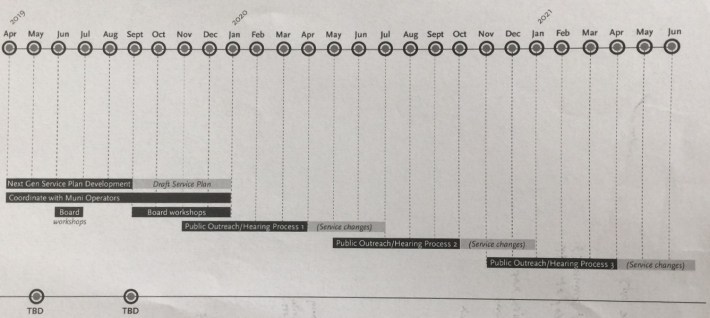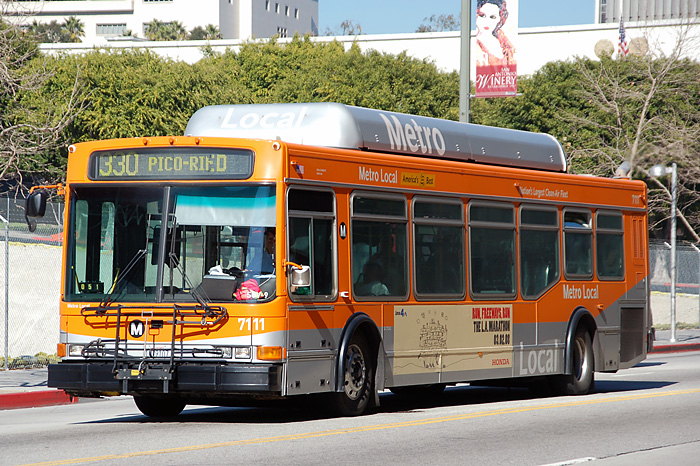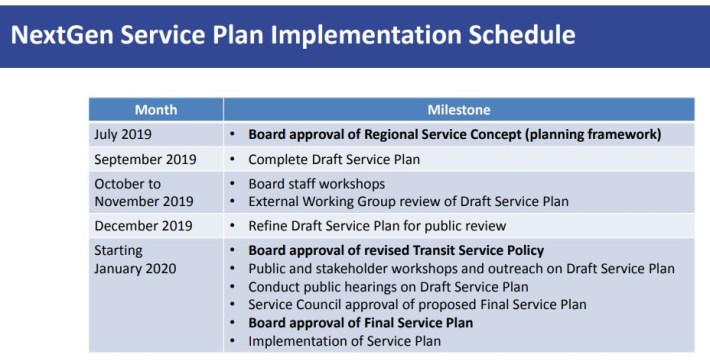Yesterday, the Metro board approved three items that set the stage for bus service improvements.
Metro is getting close to rolling out its multi-year bus service reorganization effort - called the NextGen Bus Study. This month the board approved NextGen's "Regional Service Concept" which is full of high-level platitudes like "provide high-quality mobility options" and "the bus system is easy to understand and use" and "customers are satisfied." There are hints at what changes are being contemplated: "shorter route lengths," "coordination" with municipal bus service, "standardize frequencies", "subarea transit hubs" (ie: a system less centered on downtown L.A.), improved "stop spacing," and "transit supportive infrastructure."
These over-broad statements were accompanied by an over-long staff report featuring a 63-page summary of study outreach, data evaluating existing line ridership, and a ranking of existing lines based on a complex Route Performance Index. All this appears to leading to big, positive, needed changes... but the angels and devils will be in the details. And those remain elusive.
Just when will the riding public see NextGen changes on the ground?
Metro had published a two-year schedule, showing a draft plan that would be shared internally starting in September, then approved by the board in early 2020, then implemented in three phases starting April 2020... but that schedule has now been scrubbed from the agency website. Generally not a good sign.


It was replaced with the below detail-free six-month version, which shows a draft plan release in December, and board approval and implementation at some unspecified time in 2020.
NextGen will improve L.A. bus transit. As with nearly any major changes to pretty much anything anywhere, it is likely to draw its share of criticism. Hopefully, all the data work and outreach will pay off.
Several boardmembers do not appear to be waiting for NextGen to substantially transform Metro bus service.
The board approved two motions for bus improvements that are ostensibly in conjunction with NextGen, but, to some extent, allow needed improvements to perhaps jump the queue - ie: proceed outside the confines of NextGen.
All-door boarding is a key improvement that Streetsblog has covered several times. Several U.S. transit agencies have system-wide all-door boarding, which speeds up buses and even saves money. So far, Metro has only implemented all-door boarding on Vermont and Wilshire Rapid buses and on the Silver Line BRT. Transit advocates have encouraged Metro to expand the program.
Yesterday, the board approved a motion from County Supervisor Janice Hahn to accelerate all-door boarding and other bus improvements. The motion was co-sponsored by boardmembers Hilda Solis, Eric Garcetti, Mike Bonin, and Paul Krekorian.
In addition to all-door boarding, the Hahn motion calls for accelerating:
- installation of durable vinyl seats
- better TAP, network, and schedule integration between Metro and Municipal Bus Operators
- more real-time arrival electronic displays
- incentivizing more bus shelters
The motion directs Metro to report back on these improvements at the November/December 2019 board meeting.
The board also approved a Bonin motion on improving bus speeds. That motion was co-sponsored by boardmembers Garcetti, Solis, Krekorian, and Robert Garcia.
The motion directs Metro to:
- "Develop a list of priority bus-supportive infrastructure projects needed to support the NextGen bus service plan, with an emphasis on near-term improvements that can be implemented concurrently with each phase of NextGen"
- convene a "NextGen Bus Speed Engineering Working Group" with Metro and the Los Angeles City Department of Transportation (LADOT), to meet monthly and report back to the Metro board operations committee quarterly
- coordinate with local jurisdictions and municipal operators to improve bus speeds "where bus delay hot spots exist"







